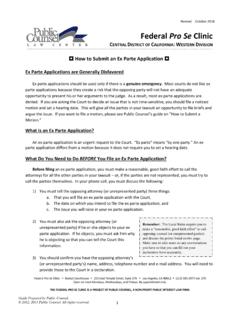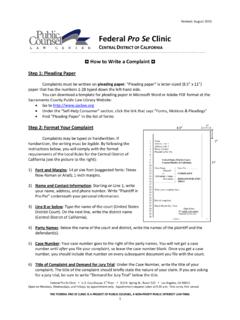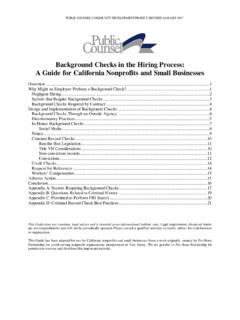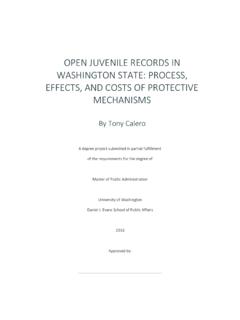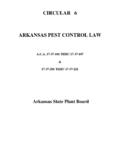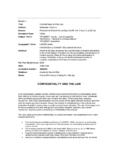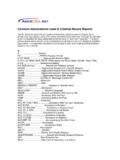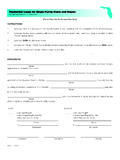Transcription of Form 990 Policy Series - Public Counsel - power of pro ...
1 form 990 Policy Series The attached Memorandum is a part of the form 990 Policy Series , developed by a group of lawyers, all members of the California bar and practicing nonprofit law (the form 990 Policy Series Group ). The form 990 Policy Series includes Memoranda containing rationales and procedures for legal Counsel to use in advising their clients on drafting and adopting appropriate policies responding to the new form 990 as well as form policies and/or questionnaires. The members of the form 990 Policy Series Group with respect to the attached Memorandum (posted July, 2011) were as follows: Joel S. Corwin, Co-Chair; Barbara Rosen, Co-Chair; Elizabeth Bluestein; Lani Meanley Collins; the late Gerald A. Laster;. Henry Lesser; Nancy McGlamery; Louis Michelson; Joy P. Paeske; Alicia Plerhoples;. Lisa A. Runquist; Robert Siemer; Myron Steeves; Patrick Sternal; and Martin J. Trupiano. The views expressed in the Memoranda do not necessarily reflect the views of the law firms or employers at which these lawyers practice or any individual member of the Group.
2 The date at the top of the attached Memorandum is the date that the Memorandum was finalized, and the Memorandum may not reflect changes in law or practice since that date. form 990 Policy Series . MEMORANDUM. Re: Document Retention and Destruction Policy form 990, Part VI, Section B, Line 14 ( form 990 Policy Series Memo #4). Date: December 1, 2009. NOTE ON THE SCOPE OF THIS MATERIAL. This material is designed to provide general guidance about an aspect of nonprofit corporate governance in the specific and limited context of the governance questions contained in the new IRS form 990 (published by the IRS in 2008 and applicable to 990 filers based on a 2009-2011 filing year phase-in period depending on the size of the nonprofit). It is intended to provide some general guidance on the establishment of processes and/or policies to address a specific governance question in the form . The subject matter of that question implicates a broad array of legal and practical issues ranging far beyond the immediate subject matter of the question itself.
3 This material may address some of those issues but does NOT attempt to review them comprehensively and is NOT intended to be relied on for guidance on how they should be addressed in any specific situation. Whether or not a nonprofit organization adopts a specific governance process or Policy (or modifies an existing one), either in response to the disclosure requirements of the new IRS form 990 or to change its governance practices for other reasons is a matter to be carefully considered by that organization, with input from its board and advisors and evaluation of its specific circumstances. The IRS has explicitly stated that adoption of the policies and practices about which the new form 990 asks is not mandatory, although the IRS has also indicated that it attaches significance to the manner in which all tax-exempt nonprofit organizations govern themselves. The inclusion of a sample Policy in this material is not intended to suggest that the Policy is appropriate for every nonprofit organization nor that, if a Policy on that topic is determined to be appropriate, the formulation in the sample necessarily fits the needs of an individual nonprofit organization.
4 A customized approach, with outside professional advice, is recommended. Accordingly, this material is intended as general information for legal practitioners advising nonprofit organizations as to their governance and does not constitute legal advice for any particular nonprofit organization. Although the subject matter of this material may have relevance to nonprofit organizations that are not required to file informational tax returns with the IRS or are permitted to file on an IRS form other than form 990, the focus of this material is 990 filers. While this material is meant to apply to form 990 filers who are exempt under Section 501(c) of the Internal Revenue Code, certain portions of this material may be applicable only to Section 501(c)(3) organizations. In addition, although this material may be of assistance with respect to nonprofit organizations that are not subject to oversight under California law, there may be portions of this material that are relevant only to nonprofits organized under, or (by reason of their California-related activities) otherwise subject to, California law and, except as specifically discussed in this material, the laws of other States are not addressed.
5 1. Summary The new form 990, at Part VI, Section B, Line 14, asks whether the organization has a written document retention and destruction Policy . As stated in the new form 990. Instructions: A document retention and destruction Policy identifies the record retention responsibilities of staff, volunteers, board members, and outsiders for maintaining and documenting the storage and destruction of the organization's documents and records.. This Memorandum is intended to provide general guidance for the consideration and adoption of a Policy responsive to the form and Instructions. 2010 Joel S. Corwin. All rights reserved. 2. Rationale for Adoption of the Policy Historically, dating to the pre-electronic records era, a principal rationale for a Document Retention and Destruction Policy ("DRD Policy "), has been to save space and save money by destroying paper documents which were no longer needed or required for an organization. Paper storage took up a lot of space, either at the organization premises or at off-site storage facilities which charged for the service.
6 Even with the dawn of the electronic records era, storage space and the cost of that space continued as an issue. Initially, records would be stored on magnetic cards or disks, which themselves also took up space, although not as much physical space as paper documents. At the same time, the electronic storage media themselves could become costly for an organization. Later, electronic records, including e-mails, were stored on servers maintained by the organization at its premises and/or off-site. As clients have indicated, this method of storage has also become costly, with the requirements of maintaining servers capable of storing vast amounts of data. At the same time, another principal rationale for the DRD Policy was to ensure that the organization retained documents which could later be required for business or regulatory purposes. For example, maintaining tax documents in case of an audit or other investigation was a concern. Similarly, employment records were viewed as worthy of retention.
7 Contract documents as well as those relating to ownership of organization assets also come into play in such a Policy . Businesses in regulated industries may have other requirements. In addition, document retention in case of litigation or governmental investigation became a consideration. In fact, particularly in light of developments in electronic (or e-). discovery, the proper maintenance and timely destruction of electronic (as well as paper). documents could save a great deal of money for an organization forced to search unwieldy and voluminous records in the face of discovery requests. At this time, compliance with law as it relates to litigation discovery and governmental investigations is another principal rationale for instituting and maintaining an appropriate DRD Policy and program. 3. Background of Requirements/Sources for the Policy A. Specific Retention Period Requirements for Different Documents State and federal laws with respect to statutes of limitation for particular lawsuits as well as specific requirements for retaining certain documents will largely determine the retention period for affected documents.
8 At the same time, certain documents are of such importance to an organization that they should be permanently retained. 2. B. Sarbanes-Oxley Requirements Section 802 (Criminal Penalties for Altering Documents) of the Sarbanes-Oxley Act ( SOX ) added Section 1519 to the federal criminal code, which provides: Whoever knowingly alters, destroys, mutilates, conceals, covers up, falsifies, or makes a false entry in any record, document, or tangible object with the intent to impede, obstruct, or influence the investigation or proper administration of any matter within the jurisdiction of any department or agency of the United States or any case filed under title 11, or in relation to or contemplation of any such matter or case, shall be fined under this title, imprisoned not more than 20 years, or both. SOX Section 1102 (Tampering with a Record or Otherwise Impeding an Official Proceeding) added a new subsection (c) to Section 1512 of the federal criminal code, which states: (c) Whoever corruptly (1) alters, destroys, mutilates, or conceals a record, document, or other object, or attempts to do so, with the intent to impair the object's integrity or availability for use in an official proceeding; or (2).
9 Otherwise obstructs, influences, or impedes any official proceeding, or attempts to do so, shall be fined under this title or imprisoned not more than 20 years, or both. In addition to possible criminal liability, civil liability may result from the wrongful destruction of evidence, or spoliation.. C. Federal Rules of Civil Procedure Among other things, Federal Rule of Civil Procedure ( FRCP ) 26(a)(1) requires a party to voluntarily provide a copy or a description by category and location of all documents, electronically stored information, and tangible things that the disclosing party has in its possession, custody, or control and may use to support its claims or defenses, unless the use would be solely for impeachment;. FRCP 26(b)(1) provides in pertinent part: Parties may obtain discovery regarding any nonprivileged matter that is relevant to any party's claim or defense including the existence, description, nature, custody, condition, and location of any documents or other tangible things and the identity and location of persons who know of any discoverable matter.
10 For good cause, the court may order discovery of any matter relevant to the subject matter involved in the action. Relevant information need not be admissible at the trial if the discovery appears reasonably calculated to lead to the discovery of admissible evidence. 3. FRCP 37(e) states: Absent exceptional circumstances, a court may not impose sanctions under these rules on a party for failing to provide electronically stored information lost as a result of the routine, good-faith operation of an electronic information system. Note that good faith is an element of this defense. Negligence, willfulness or gross negligence in dealing with these matters will result in penalties. D. Zubulake and Other Cases In a Series of five opinions involving an employment discrimination case (Zubulake I-V), the District Court for the Southern District of New York dealt with a number of issues relating to electronic discovery. In Zubulake v. UBS Warburg, LLC, 217 309 ( 2003) ( Zubulake I ), the court dealt with the scope of electronic discovery and the issue of who should pay for it.
